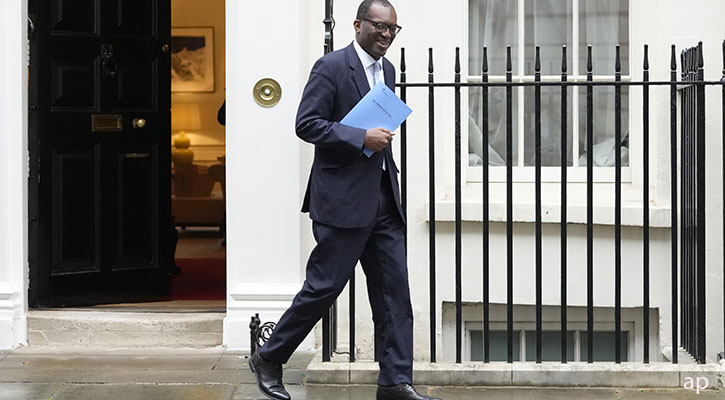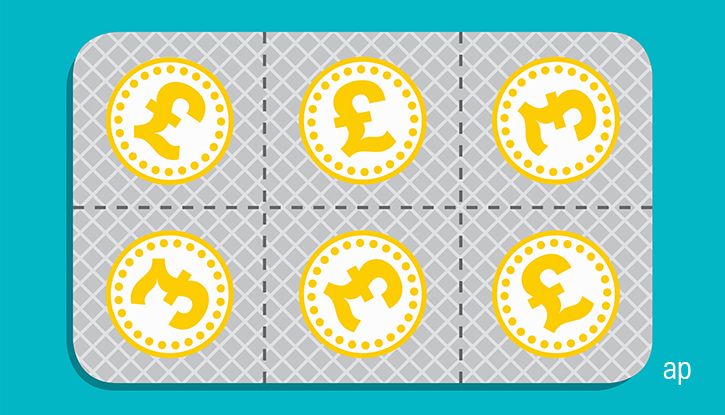
The fallout from Friday’s mini-Budget continued on Monday after the Bank of England defied expectations of an emergency rate hike that commentators argued would have supported the pound and restored calm to anxious financial markets.
By holding its nerve amid the chaos, the central bank has effectively bounced the ball back into the government’s court, and highlighted the widening gulf between UK fiscal and monetary policy.
Just after the stock market close, the Bank put out a statement saying it is "monitoring developments in financial markets very closely in light of the significant repricing of financial assets" but, crucially, stopped short of a rate hike. The pound fell again on the news.
Governor Andrew Bailey welcomed "the government’s commitment to sustainable economic growth" but effectively said to financial markets that the Bank is not intervening to support the crashing pound. Any new rate changes will be made at the next meeting – and agonisingly, for a government under intense pressure, that meeting is in November.
All Monday, financial markets had been expecting the Bank to make an emergency rate rise to shore up confidence in the currency, following last week’s MPC meeting. Friday saw a plunge in sterling and that continued on Monday morning with a brief fall to a record low of $1.0349 before recovering some losses. Towards the close of the London stock exchange, the pound was trading at around $1.08 but fell to $1.07 after the Bank's non-intervention.
Higher Rates and Currencies
How do interest rates impact on the currency? Higher interest rates encourage overseas investors into sterling assets because yields are made more attractive (that’s one reason why global investors are buying into the dollar right now because the Federal Reserve has tightened monetary policy much faster than in other countries). The idea is that stimulating buying in sterling, gilts and UK equities, will stave off the selling pressure. The Bank already raised interest rates last Thursday by 50 basis points to 2.25%; rates have gone from 0.10% in December 2021 as it scrambles to tackle soaring inflation.
Why does the Bank’s action matter? In essence, the central bank and government are pulling in different directions: the Bank wants to make money more expensive to slow inflation, while Numbers 10 and 11 Downing Street want to stimulate the economy through tax cuts and spending.
As people are pointing out, if mortgages are becoming more expensive, this will counteract some of the boost from tax cuts – meaning the average person will not have that much significant extra cash to spend in the economy. (Calculations show that the more you earn, the more you benefit from next year’s tax changes.)
Asked in the House of Commons on Friday if the two opposing strategies are reconcilable, the chancellor assured MPs that they were, given the different remits of the Bank (keeping inflation at 2%) and the government (boosting growth).
Markets signalled their lack of confidence in this position immediately: they delivered their verdict on Kwasi Kwarteng’s first official outing as chancellor by selling sterling and UK government bonds, or gilts. Here’s our coverage of the day’s events, which saw a sell-off in sterling to $1.09, its lowest level since 1987, and steep increases in gilt yields.
A deepening sense of crisis was highlighted by growing calls for a vote of no confidence in the nascent Truss government. Liz Truss has been prime minister for 20 days.
Apart from the expected government reaction that it doesn’t respond to market movements, the Treasury did announce that the "Medium-Term Fiscal Plan" will be published on November 23. This will be accompanied a growth forecast from the Office for Budget Responsibility, which was conspicuously absent on Friday.
Remit Under Fire
Before the high inflation era, the Bank’s independence from government was seen as a positive for the economy. But in the Conservative party leadership campaign, candidates started to brief the media that they wanted to see changes at the Bank of England.
This was interpreted as a sign of executive overreach that had marked the Johnson era – institutions (the BBC, Channel 4 etc) that failed to align with the government’s aims were effectively given notice that they faced reform or at the very least, intense political scrutiny.
What does the latest economic turbulence mean for your portfolio? Mike Coop, chief investment officer at Morningstar Investment Management, EMEA, said:
"The mini-Budget comes at a critical time. The UK is on the brink of recession and British households face rapidly rising prices across the board. The support package will help– but at the cost of more government debt and the risk of stoking inflation. With further interest rates priced in and Sterling near record lows vs the US Dollar, markets are already priced for a gloomy scenario.
"Investors need to consider how they can best prepare their portfolios to withstand such events and government responses to them. Key to this is favouring assets that already reflect bad news and adverse scenarios as well as assets that can perform well in different scenarios. The selloff in bonds and sterling is making both more attractive for longer term investors seeking to fortify portfolios, while China, Germany and emerging market bonds already reflect pessimism and offer patient investors better than usual prospects."



























